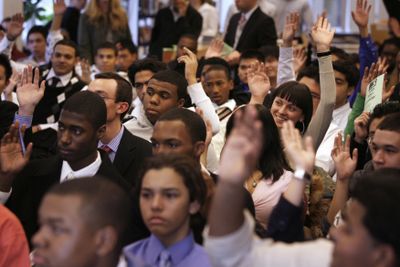An economic ‘teachable moment’
Teachers jump at chance to guide students through real-time downturn

NEW YORK – Stocks are down, down, down. But student interest in economics appears to be trending upward.
The financial crisis has made “the dismal science” more relevant and immediate to many high school and college students, and they are suddenly paying closer attention in class.
“Now we can actually see the examples while they happen, instead of relying on history. It’s been the most engaging class ever,” said New York University junior George Schwartz, who dropped macroeconomics the first time he took it, but is so fascinated this time that he has decided to major in economics.
Instructors are delighted by the opportunity to use the dramatic events on Wall Street to explain concepts students might otherwise find dry, such as liquidity and Federal Reserve monetary policy.
“It is a great time to be in this business,” said Jonathan Peters, a College of Staten Island professor. “It’s a tremendous opportunity. It’s a teachable moment. It’s a chance to explain these topics in a very direct way.”
Instead of simply discussing the theory surrounding a recession, Peters can show students a real one, step by step. While usually he has to fight to convince them that regulation is useful, that has become easy nowadays, he said.
At the High School of Economics and Finance in New York’s financial district, computer science teacher Aristedes Lourdas is also finding it easy to engage students.
Last year, his students were so unenthusiastic about analyzing the financial markets that Lourdas assigned his class to chart NBA players’ salaries and statistics. This year, “I haven’t had to use the NBA at all,” he said. Now each student is following the performance of three stocks of their choosing.
Lourdas said students are more interested because they realize that the dealings a few blocks away on Wall Street do affect their lives. The downturn has some worried they may not be able to afford college.
“The inner-city kids were kind of indifferent,” Lourdas said. But now “all of a sudden, you see it’s clicking. They’re getting it. Last year, it was more like feeding them the information.”
The Arizona Council on Economic Education is helping teachers design classes based on the crisis. Senior program adviser John Morton said that in one lesson he is designing, students will create a market bubble and watch it pop. In other lessons, students will try to apply lessons from the Great Depression to the current crisis.